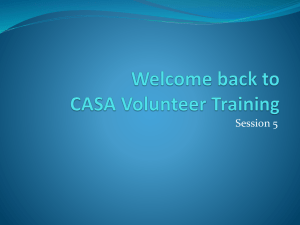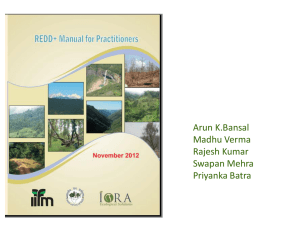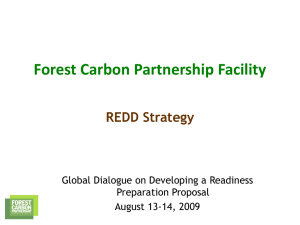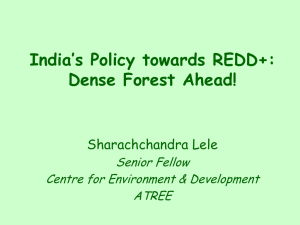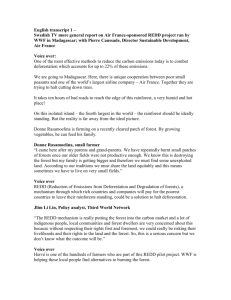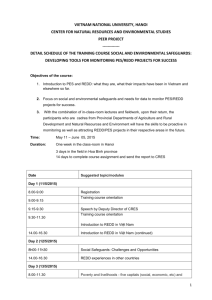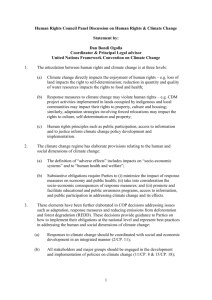Delivered at - Rights and Resources Initiative
advertisement
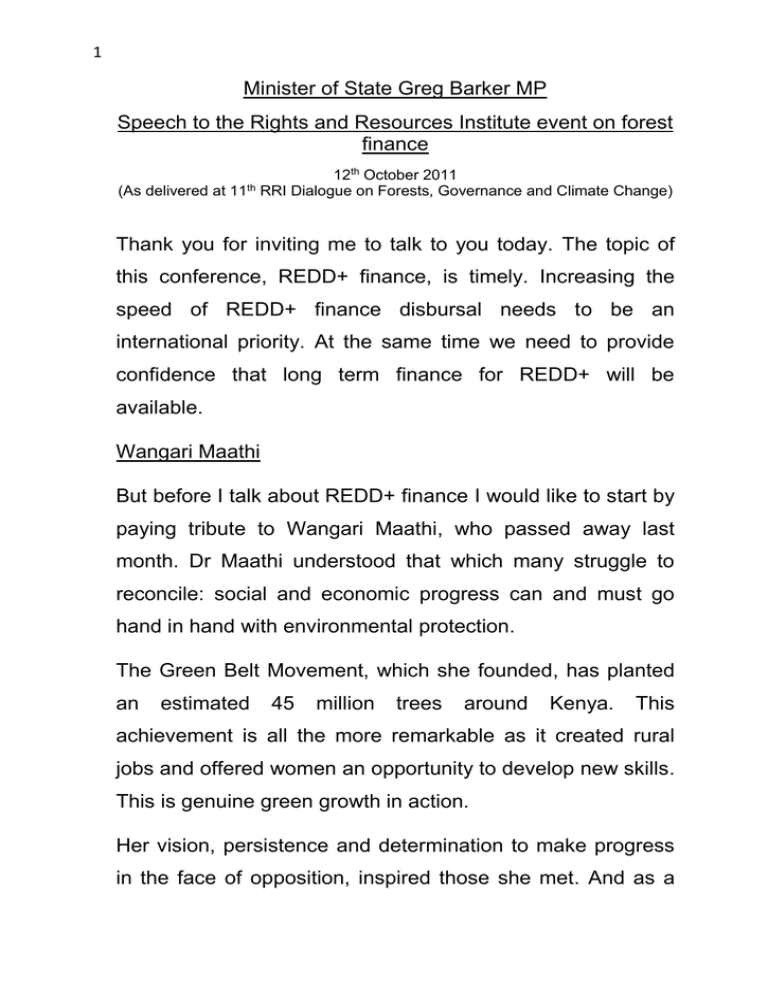
1 Minister of State Greg Barker MP Speech to the Rights and Resources Institute event on forest finance (As delivered at 11th 12th October 2011 RRI Dialogue on Forests, Governance and Climate Change) Thank you for inviting me to talk to you today. The topic of this conference, REDD+ finance, is timely. Increasing the speed of REDD+ finance disbursal needs to be an international priority. At the same time we need to provide confidence that long term finance for REDD+ will be available. Wangari Maathi But before I talk about REDD+ finance I would like to start by paying tribute to Wangari Maathi, who passed away last month. Dr Maathi understood that which many struggle to reconcile: social and economic progress can and must go hand in hand with environmental protection. The Green Belt Movement, which she founded, has planted an estimated 45 million trees around Kenya. This achievement is all the more remarkable as it created rural jobs and offered women an opportunity to develop new skills. This is genuine green growth in action. Her vision, persistence and determination to make progress in the face of opposition, inspired those she met. And as a 2 result her legacy will go far beyond her own accomplishments. Forest transition The opposition that Dr Maathi encountered is part of a larger picture. History tells us that as countries develop they cut down their forests to make way for agricultural and industrial expansion. Later in the development cycle deforestation slows, plateaus and decreases as social priorities evolve. Immediate concerns about food, shelter and security make way for longer term worries, including environmental ones. Cross Roads Today, many developed countries have gone through this cycle. They have stable or increasing, albeit low, forest cover. Many developing countries however are in varying stages of the transition. And there is a choice to be made: business as usual or a new, low-deforestation development pathway. Forests support 1.2 billion of the world’s poorest people and harbour over 80% of terrestrial biodiversity. Deforestation results in about 17% of global GHG emissions. Whilst the value of the services provided by forests may not always be captured in the market, that does not mean the markets do not rely on them. They do, and Governments are starting to 3 realise that the only real development is sustainable development. General plan/Forest finance The good news is that we are making progress. In Cancun we agreed a framework for a REDD+ mechanism and we will develop design guidelines for key elements of that mechanism at Durban. We have developed FLEG-T agreements and supported work on sustainable commodities to ensure that unsustainable or illegal commodities do not undermine sustainable and legal ones. There is a clear direction of travel. Deforestation is going down. But not fast enough. Improving short-term finance disbursal On REDD+ finance, money has not been disbursed as fast as we would have liked. Only a fraction of the $4.5 billion or so committed for REDD+ has been delivered. We need to speed things up for example by harmonising indicators by which REDD+ projects are assessed. And by agreeing in Durban to robust design guidelines for forest monitoring systems and reference levels against which progress on REDD+ will be measured. 4 Forest countries will need to act quickly to create these systems. Once set up these will open the door to large scale finance transfers for measured reductions in deforestation. Donors need realise traditional project- based aid is too slow. Strategic interventions are needed. There is also an onus on forest countries to demonstrate cross government support for the reforms needed to make REDD+ a reality. Long term finance signal Speeding up disbursal is an immediate concern. But we also need to build confidence that REDD+ finance will be available in the long term. We can do this by making progress on the wider discussions on long term climate finance. The AGF report showed that developed countries can meet the goal of mobilising $100bn a year by 2020. It’s not easy. But it can be done. The focus for this year is on increasing lending from multi lateral development banks, working with international transport systems and leveraging private sector finance. We’re working through bodies like the G20 to make things happen. 5 There is regular discussion about including REDD+ in the international carbon markets to harness private sector investment. This may indeed be an option in the future. But more work needs to be done to determine the preconditions that would need to be met to make it possible. We must be aware that such an approach may incentivise unfair allocation of land tenure. However if implemented correctly REDD+ can act as a trigger to resolve land tenure conflicts. Securing land tenure can provide those with limited means with enduring natural assets which they can improve and bequeath to subsequent generations. This approach to poverty alleviation contradicts those who say the poor face a choice between higher incomes and a better environment. This is a false choice. UK REDD+ finance In addressing the gap in funding for REDD+, the UK is playing its part. Since I spoke to you last, an independent review has been published on the options for how we can best direct UK finance for forests. Many of you have read the review and commented either at events organised by UK officials or on the DECC blog. Thank you all for your advice and help so far. It is much appreciated. 6 We agree with the thrust of the review: that increased finance for the multilateral funds should be complemented with strategic bilateral partnerships, and a focus on working with the private sector. We are looking to create a balanced portfolio covering countries in different regions and at different stages of development. We are now scoping out the options in more detail: starting with the countries identified as priorities in the PWC report. However we will not limit ourselves to these if transformative opportunities offer themselves elsewhere. We are still at the start of the process and decisions have yet been made.. We will be looking to engage with all interested parties throughout the development of our programme. Addressing drivers through work with commodity supply chains Regardless of whether or not REDD+ enters the carbon market, securing fair land tenure must be the foundation of REDD. Not just for ethical reasons, but because it is crucial in attracting private sector investment. No matter how much REDD+ finance we raise and deliver, it will be ineffective unless it addresses the underlying drivers of deforestation. Growing and developing populations are increasing the demand for agricultural products and hence land. Without strategic investments and legal reforms in forest countries 7 REDD+ finance will struggle to outcompete the financial incentives created by this demand. Any REDD+ programme must operate in collaboration with the key supply chain and agri-business companies to reform supply chains. Companies such as Unilever are pushing the envelope in this area with their commitment to remove all unsustainable palm oil from the supply chain by 2015. This could be interpreted as a great act of corporate responsibility. But perhaps it fits better into what Paul Polman, Unilever’s CEO, would call long-term capitalism. Donors need to work with other companies that use commodities such as palm oil, beef or soy in their supply chains so that they too can set similar targets. Prospects for Rio+20 Looking forward, next year world leaders will meet in Rio to push forward the agenda on sustainable development. Such events occur few times in our working lives. So we must seize this opportunity to drive our work on forests forward. To increase the disbursal of REDD+ finance. To offer confidence in the availability of longer term REDD+ finance. To combine efforts on REDD+ with private sector supply chain initiatives. If we manage it well we can orchestrate a perfect storm of incentives. 8 Governments need to step up. Companies need to step up. NGOs need to step up. The challenges we face are not new but we must be the ones to solve them.
